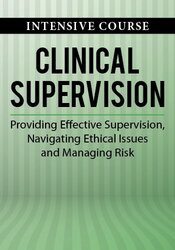

You’ve worked hard as a professional, developing clinical skills and intuition that have been invaluable. You’re ready to step into your next role: clinical supervisor. But being a good clinician isn’t enough to guarantee you’ll be a competent supervisor. Do you have the knowledge, skills and attitude to provide effective and ethical supervision?
Or maybe you’re already a clinical supervisor and your supervision has started feeling outdated, monotonous and boring. You find yourself going through the motions; supervising new clinicians just isn’t as rewarding as it once was. You’re left searching for ways to breathe new life into your practice.
In this experiential, in-depth recording you'll dig deep into the supervisory process, answers your questions about ethical issues, risk and liability, and prepares you to master the art and science of clinical supervision.
This workshop is specifically designed to teach you how to proactively handle and confidently address the most difficult issues faced by clinical supervisors today. You’ll learn:
This interactive, experiential recording will help answer your questions and leaves you feeling inspired to provide comprehensive, ethical supervision to the next generation of clinicians!
This online program is worth 12 hours CPD.
| File type | File name | Number of pages | |
|---|---|---|---|
| Manual - Clinical Supervision (1.87 MB) | 124 Pages | Available after Purchase |

George B. Haarman, PsyD, LMFT, is a licensed clinical psychologist and a licensed marriage and family therapist with over 40 years of experience working in a variety of settings, including private practice, youth detention centers, juvenile group homes, child protective services, and juvenile probation. Dr. Haarman completed basic and advanced supervisor training required by the Kentucky Board of Psychology Examiners and maintains approval by the board to act as a supervisor. In his private practice, Dr. Haarman has provided clinical supervision to clinical and counseling practicum students as well as consultation about clinical supervision to psychologists for over 25 years. He is a national speaker on clinical supervision, depression, school refusal, ADHD, emotional disorders in children and adults and the DSM-5®. He is the author of three books: Clinical Supervision: Legal, Ethical, and Risk Management Issues, School Refusal: Children Who Can’t or Won’t Go to School, and Mastering DSM-5®. Dr. Haarman received his doctorate in clinical psychology from Spalding University in 1989. He has been an instructor at Jefferson Community College, Bellarmine University, and Spalding University.
Speaker Disclosures:
Financial: Dr. George Haarman maintains a private practice and is an adjunct professor Spalding University, Jefferson Community College, and Bellarmine University. He receives a speaking honorarium and recording royalties from PESI, Inc. He has no relevant financial relationships with ineligible organizations.
Non-financial: Dr. George Haarman is a member of the American Psychological Association and the Kentucky Psychological Association.
Limitations of the Research and Potential Risks
| 5 |
|
| 4 |
|
| 3 |
|
| 2 |
|
| 1 |
|
Satisfaction Guarantee
Your satisfaction is our goal and our guarantee. Concerns should be addressed to info@pesi.co.uk or call 01235847393.
Please wait ...